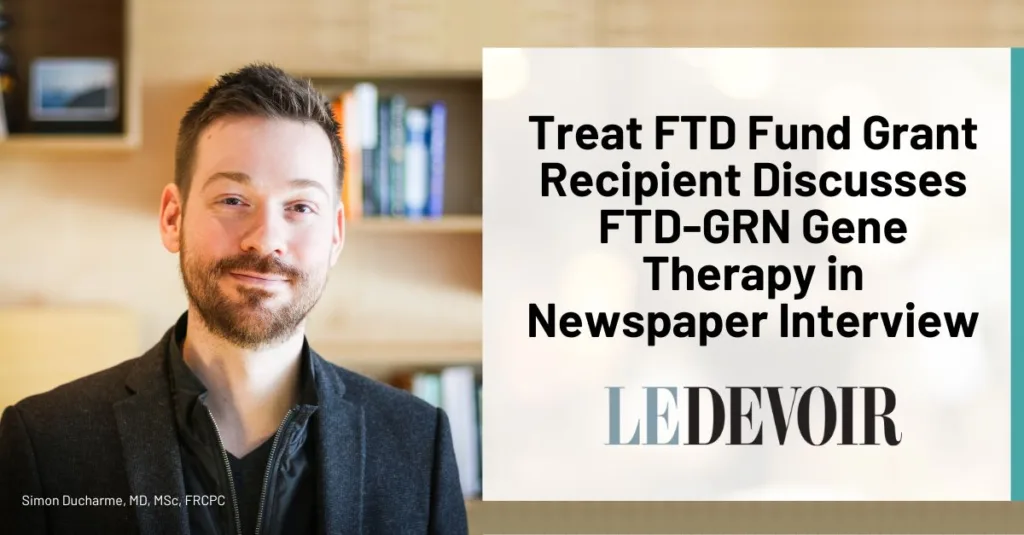Treat FTD Fund Grant Recipient Discusses FTD-GRN Gene Therapy in Newspaper Interview

Simon Ducharme, MD, MSc, FRCPC, of McGill University, a recent recipient of a grant through the Treat FTD Fund, discussed an experimental gene therapy for FTD-GRN in a December interview with the Quebec French-language newspaper Le Devoir.
Approximately 40% of people diagnosed with FTD have a family history of one or more blood relatives diagnosed with FTD or a related condition, known as “familial FTD.” Of those with familial FTD, a portion of cases may be attributed to an FTD-causing gene mutation, such as mutations in the GRN gene that can lead to FTD-GRN. GRN regulates the production of progranulin, a protein that helps maintain the health of nerve cells – but the GRN mutation can cause a lack of progranulin production, leading to neurodegeneration.
In the interview, Dr. Ducharme provides a scientific overview of PBFT02, a gene therapy developed by the genetic-therapy company Passage Bio targeting FTD-GRN and currently undergoing a phase 1/2 clinical trial. The treatment consists of a single injection that delivers a non-mutated GRN gene using a modified virus to restart progranulin production.
“These viruses are not toxic, they are not contagious, and they are not going to spread,” Dr. Ducharme said of the modified viruses. “Only their envelope is used to deliver the normal gene into the brain. And the administration of a single dose should be enough because the new genetic code that we are going to inject will remain in the neurons in perpetuity.”
The current phase of the study, which is called upliFT-D and is being conducted by Dr. Ducharme in Canada and at two other sites in the United States and Brazil, is to verify that participants tolerate the treatment well and determine the optimal dose for the therapy. Dr. Ducharme notes that for this phase, upliFT-D has recruited persons with FTD who are showing symptoms but whose progression is not too advanced.
“If the patient already has symptoms, we don’t realistically expect them to return to normal, even though theoretically this treatment could be curative,” Dr. Ducharme said. “Because when you have symptoms, it means that there has been a little bit of degeneration, that neurons have died.”
According to Dr. Ducharme, the goal of PBFT02 is to block or slow the progression of FTD. “If we can do that, the next step would be to offer the treatment to asymptomatic carriers — people who have the mutation but don’t have symptoms yet,” he said.
In December, Passage Bio announced promising preliminary results for the clinical trial, finding that the therapy was generally well tolerated by participants. Most importantly, the company saw a significant increase in progranulin levels in trial participants, remaining above the FTD-free baseline six months after dosage.
In 2022, Dr. Ducharme was awarded a grant through the Treat FTD Fund, a partnership between AFTD and the Alzheimer’s Drug Discovery Foundation, to support his research evaluating the use of nabilone, a synthetic cannabinoid, to treat behavioral symptoms of FTD.
Are you interested in taking part in research like the upliFT-D trial? Sign up for the FTD Disorders Registry to stay current on research opportunities and to participate in ongoing surveys to help researchers better understand FTD and its lived experience.
By Category
Our Newsletters
Stay Informed
Sign up now and stay on top of the latest with our newsletter, event alerts, and more…

